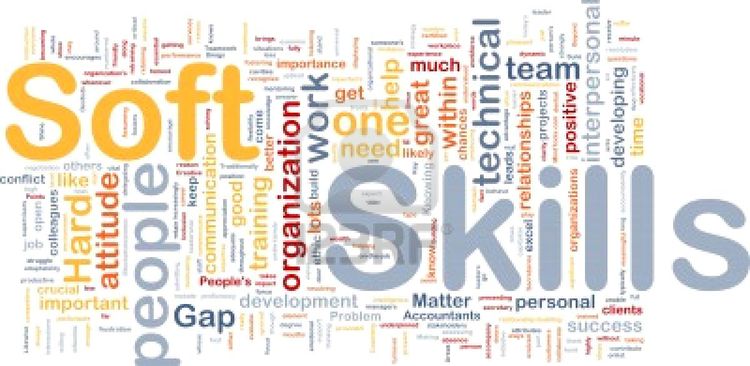
Let’s start with some definitions. Hard skills form the “what” of our careers, establishing our professional identities on the basis of industry / sector or functional focus. If someone is a VP of Business Development, it’s likely he has “hard” sales and marketing skills including targeting prospects, negotiating terms and closing deals. If someone is a Chemical Engineer for an oil company, you can expect she has “hard” knowledge of both engineering and the energy sector. While most of us can probably identify our hard skills‒the building blocks that form the foundation or base of our careers‒it’s the soft skills that serve as the mortar that holds those blocks together.
I had an executive coaching client who had risen rapidly through a major financial institution. A quick study, she was could rapidly assess what needed to be done and set goals, put together a plan to accomplish them and execute on the plan successfully. All went well as long as she was an individual contributor, but some cracks began to show when she started to manage others. She was great at “get ‘er done” but often left a body count in her wake. In her singular focus to accomplish the task, she pushed others as hard as he drove herself and assumed her urgency would motivate them. When her direct reports started to push back, she was at a loss and cracked the whip even harder.
When complaints started rolling into HR and people refused to join her team, the organization realized that this star producer had become a problem, and I was engaged as her coach. What we discovered as we began to work together was that the skill set that had propelled her to success in her career to date had been based on deep knowledge of the banking industry, strong operations experience and exceptional problem solving and decision making–all hard skills. Her difficulties were not in the “what” but the “how.”
The organization identified the problematic behaviours; our work together teased out the underlying assumptions about what she thought she “had” to do to achieve success. Once she understood the impact of her behaviour, she was open to exploring alternatives, and our focus turned to developing the “soft” skills of communicating more fully and frequently with her teams, delegating tasks with enough information for her direct reports to succeed and shifting her perception of her role from that of micro-manager to resource.
It took a while for her to fully incorporate the new behaviours and for her staff to “buy” that she was changing, but over time, the dynamic shifted. She established a new reputation as a strong and capable leader committed to engaging and developing people and became an “employer of choice” in the bank who went on to further career success.
Here are the lessons she reported having learned from our time together:
- An excellent book on the subject says it all in its title, What Got You Here Won’t Get You There. While hard skills are necessary to build a career, they’re not sufficient for long-term career success.
- Her greatest strengths, when overused had become her weaknesses. Because she had been so “good” at what she did, she had ignored the development of soft skills to her detriment. Once she recognized the limitations she had placed on herself, she was motivated to “do different.”
- Shifting from a familiar set of behaviours is simple in theory, but not easy in practice! All change is a process that moves from certainty through uncertainty to new certainty at a higher level and can be tough going. Having an objective caring other at her side made the process easier.
- Development has broad benefits. Not only did she improve her abilities as a manager, her new behaviours carried over into other areas. She learned to use influence with senior-level peers, increasing her effectiveness. Enhanced managing up skills led to greater trust on the part of her boss, who included her in more interesting and visible initiatives. Even her family reported she was a lot more fun to have around once she stopped trying to order them around!
In an academic paper entitled “Hard evidence on soft skills,” co-authors James J. Heckman and Tim Kautz cite “recent evidence on the importance of personality in economic and social life,” noting that “success in life depends on many traits” and not just those that can be measured in terms of achievement. They conclude, “Personality traits predict and cause outcomes.” They note that all of us have traits that tend to be stable across a wide range of situations. How we display those traits “depends on incentives to apply effort in the situations where they are measured and also depends on other traits and skills.”
The good news is that our traits are not “set in stone.” They change over the course of our lives, especially when they are developed through means such as education, responding to the changing needs of environments and coaching support. So remember: while your hard skills form the foundation of your career, ongoing success depends as much on the soft skills. In other words, it’s NOT all about that base!
If you’d like to expand your range of responses and up your emotional intelligence, 2BDetermined can help. Explore how working with a coach can help you clarify and achieve your career goals by booking an initial consultation. We’ll get to know each other, and you can see how an objective and caring other can support you in taking effective action.

Day Merrill, M.A., is the founding Partner and Career/Executive Coach for 2BDetermined. She is a 30-year career services professional with expertise coaching individuals and teams on a range of career and work-related topics as well as consulting to organizations in Canada and the U.S. on their workforce development needs. Day holds a B.A. from Connecticut College, a Master of Arts from Wesleyan University and has completed Coach U’s coach certification training.